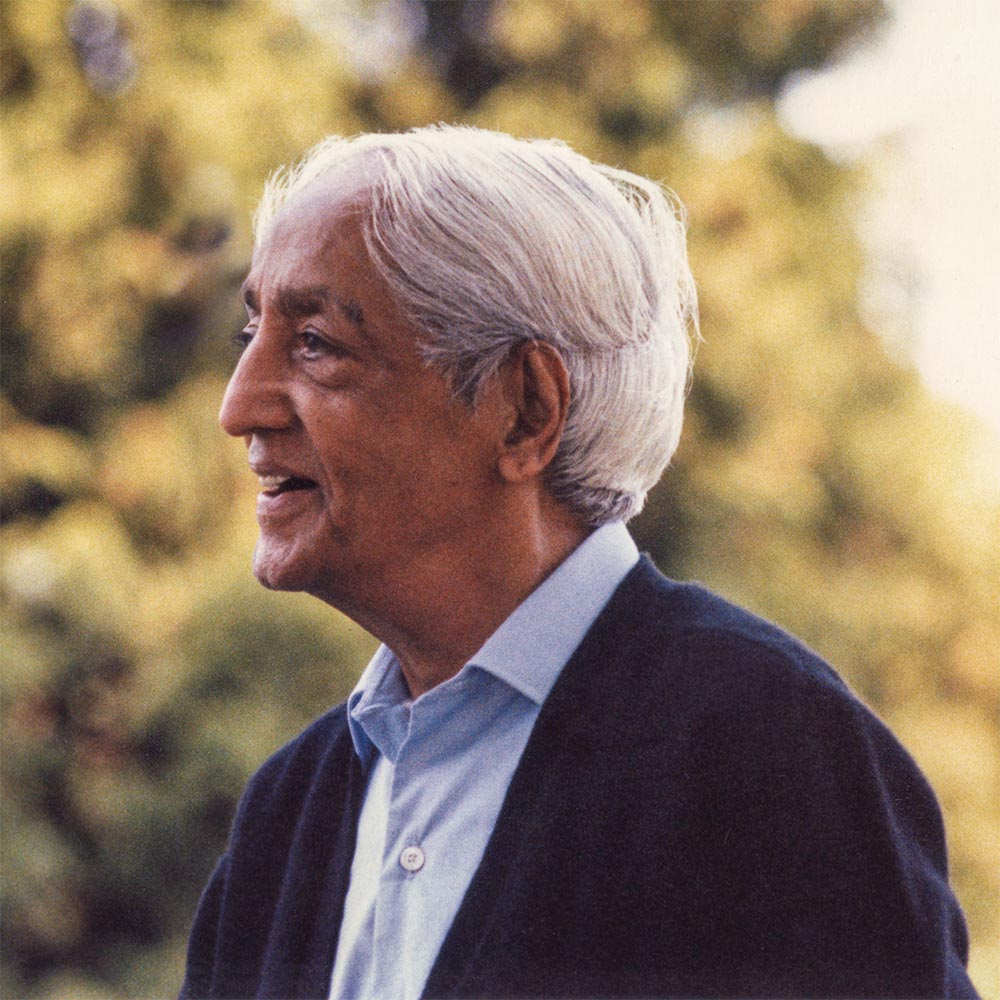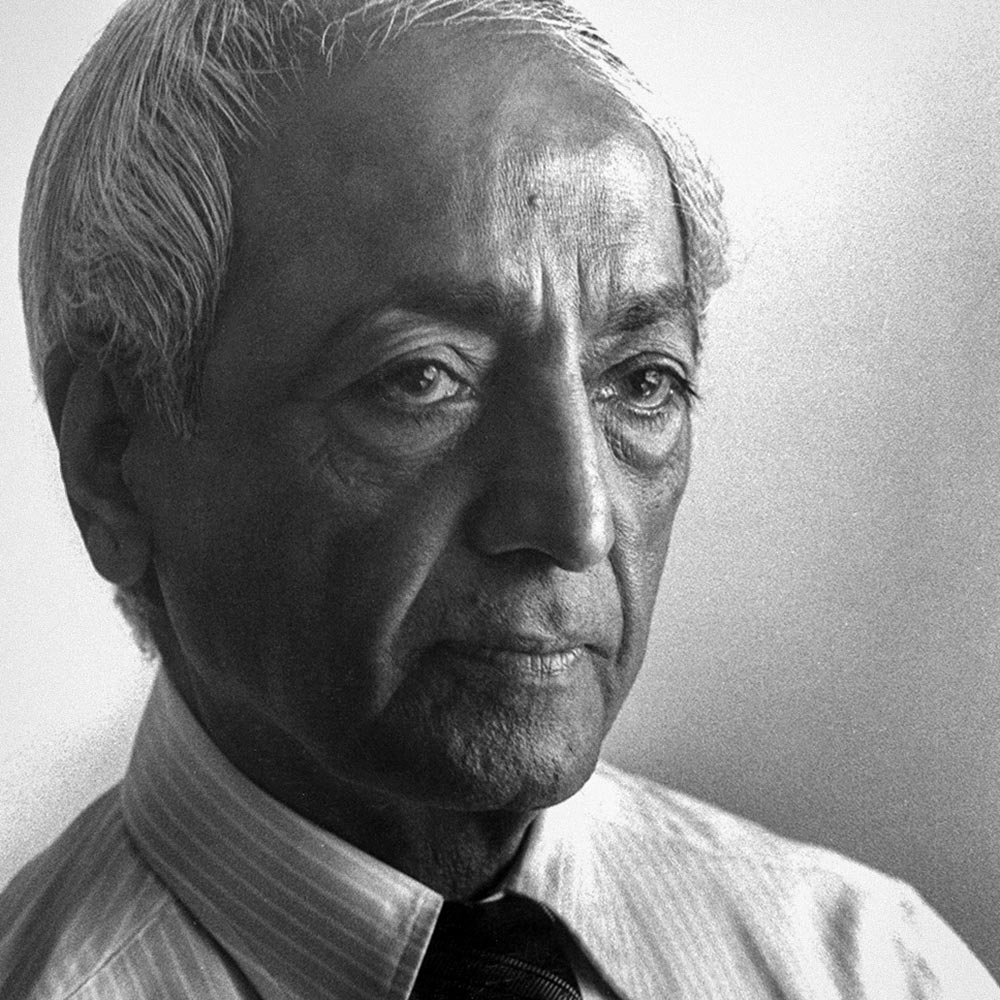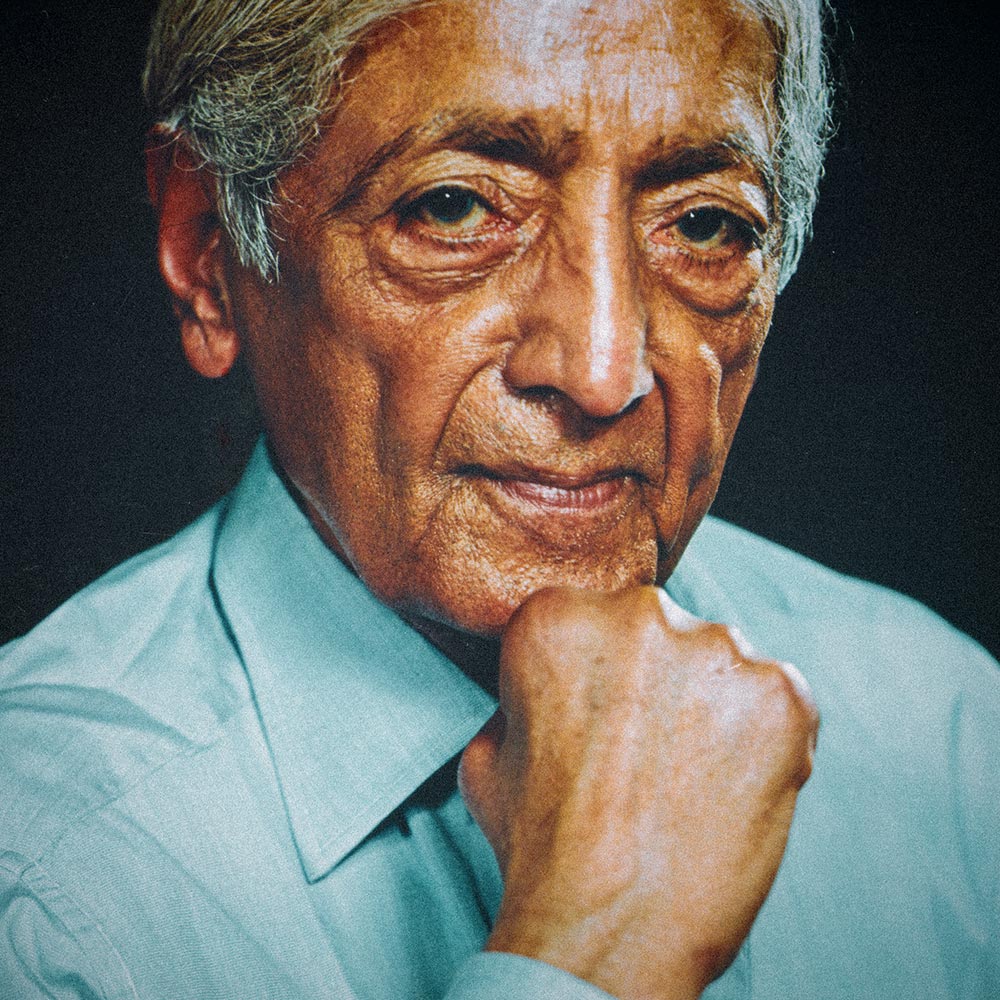If there is no fundamental change, the future is what we are doing in our lives in the present.
Krishnamurti, Krishnamurti to Himself
Read More
All OUTWARD forms of change brought about by wars, revolutions, reformations, laws and ideologies have completely failed to change the basic nature of man and therefore of society.
Krishnamurti, Freedom From the Known
Read More
If we are to bring about a true revolution in human relationship, which is the basis of all society, there must be a fundamental change in our own values and outlook.
Krishnamurti, Education and the Significance of Life
Read More
Energy is needed not only for external change, but also to bring about a deep, inward transformation or revolution.
Krishnamurti, The Awakening of Intelligence
Read More
Energy is needed not only for external change, but also to bring about a deep, inward transformation or revolution. One must have an extraordinary sense of energy which has no cause, which has no motive, which has the capacity to be utterly quiet, and this very quietness has its own explosive quality. One sees how human beings waste their energy, in quarrels, in jealousies, in a tremendous sense of anxiety, in the everlasting pursuit of pleasure and in the demand for it; it is fairly obvious that this is a wastage of energy. And is it not also a wastage of energy to have innumerable opinions and beliefs about everything? – how another should behave, what another should do and so on. Is it not a waste of energy to have formulas and concepts? In this culture we are encouraged to have concepts according to which we live. Don’t you have formulas and concepts in the sense of having images of how you should be, what should happen? – in the sense of thought which rejects ‘what is’ and formulates ‘what should be’? All such endeavour is a waste of energy.
I see that I must change completely from the roots of my being.
Krishnamurti, Freedom From the Known
Read More
First of all, can you reject all authority? If you can it means that you are no longer afraid. Then what happens? When you reject something false which you have been carrying about with you for generations, when you throw off a burden of any kind, what takes place? You have more energy, haven’t you? You have more capacity, more drive, greater intensity and vitality. If you do not feel this, then you have not thrown off the burden, you have not discarded the dead weight of authority.
But when you have thrown it off and have this energy in which there is no fear at all – no fear of making a mistake, no fear of doing right or wrong – then is not that energy itself the mutation? We need a tremendous amount of energy and we dissipate it through fear but when there is this energy which comes from throwing off every form of fear, that energy itself produces the radical inward revolution. You do not have to do a thing about it.
Is there actually time in the psychological world – that is, to change that which is to something totally different?
Krishnamurti, Krishnamurti to Himself
Read More
Time is a deceiver: it does not do a thing to help us bring about a change in ourselves.
Krishnamurti, Freedom From the Known
Read More
When there is a motive, there is actually no change at all.
Krishnamurti, Krishnamurti to Himself
Read More
I must change first; I must see the nature and structure of my relationship with the world – and in the very seeing is the doing. Therefore I, as a human being, bring about a different quality, and that quality is the quality of the religious mind.
Krishnamurti, Freedom From the Known
Read More
A very important and urgent question: can you bring about change in yourself? Don’t say, ‘If I change, will it have any value? Won’t it be just a drop in a vast lake and have no effect at all? What is the point of my changing?’ That is a wrong question.
Krishnamurti, Krishnamurti to Himself
Read More
Change now completely, change with great passion, let the mind strip itself of everything, of every conditioning, all knowledge, of everything it thinks is ‘right’ – empty it.
Krishnamurti, The Impossible Question
Read More
Systems, whether educational or political, are not changed mysteriously; they are transformed when there is a fundamental change in ourselves.
Krishnamurti, Education and the Significance of Life
Read More
All over the world there are revolts and revolutions in order to change the social structure. Obviously the structure has to be changed; is it possible to change it without violence?
Krishnamurti, The Awakening of Intelligence
Read More
Institutions can never change humanity psychologically, deeply.
Krishnamurti, Krishnamurti to Himself
Read More
Ideals and blueprints for a perfect utopia will not bring about the radical change of heart which is essential if there is to be an end to war and universal destruction.
Krishnamurti, Education and the Significance of Life
Read More
These quotes only touch on the many subjects Krishnamurti inquired into during his lifetime. His timeless and universal teachings can be explored using the Index of Topics where you will find texts, audio and video related on many themes. Another option is to browse our selection of curated articles or more short quotes. Krishnamurti’s reply when asked what lies at the heart of his teachings can be found here. Many Krishnamurti books are available, a selection of which can be explored here. To find out more about Krishnamurti’s life, please see our introduction and the biography. We also host a weekly podcast, and offer free downloads. Please visit our YouTube channel for hundreds of specially selected shorter clips. Below, you can learn more about Krishnamurti and our charity which he founded in 1968.

Who Was Krishnamurti?
J. Krishnamurti (1895-1986) is widely regarded as one of the greatest thinkers and religious teachers of all time. He spoke throughout the world to large audiences and to individuals, including writers, scientists, philosophers and educators, about the need for a radical change in mankind. Referring to himself, Krishnamurti said:
He is acting as a mirror for you to look into. That mirror is not an authority. It has no authority, it’s just a mirror. And when you see it clearly, understand what you see in that mirror, then throw it away, break it up.
Krishnamurti was concerned with all humanity and held no nationality or belief and belonged to no particular group or culture. In the latter part of his life, along with continuing to give public talks, he travelled mainly between the schools he had founded in India, Britain and the United States, which educate for the total understanding of man and the art of living. He stressed that only this profound understanding can create a new generation that will live in peace.
Krishnamurti reminded his listeners again and again that we are all human beings first and not Hindus, Muslims or Christians, that we are like the rest of humanity and are not different from one another. He asked that we tread lightly on this earth without destroying ourselves or the environment. He communicated to his listeners a deep sense of respect for nature. His teachings transcend man-made belief systems, nationalistic sentiment and sectarianism. At the same time, they give new meaning and direction to mankind’s search for truth. His teaching is timeless, universal and increasingly relevant to the modern age.
I am nobody. It is as simple as that. I am nobody. But what is important is who you are, what you are.
Krishnamurti
Krishnamurti spoke not as a guru but as a friend. His talks and discussions are based not on tradition-based knowledge but on his own insights into the human mind and his vision of the sacred, so he always communicated a sense of freshness and directness, although the essence of his message remained unchanged over the years. When Krishnamurti addressed large audiences, people felt that he was talking to each of them personally, addressing their own particular problem. In his private interviews, he was a compassionate teacher, listening attentively to those who came to him in sorrow, and encouraging them to heal themselves through their own understanding. Religious scholars found that his words threw new light on traditional concepts. Krishnamurti took on the challenge of modern scientists and psychologists and went with them step by step, discussing their theories and sometimes enabling them to discern the limitations of their theories.
Krishnamurti left a large body of literature in the form of public talks, writings, discussions with teachers and students, scientists, psychologists and religious figures, conversations with individuals, television and radio interviews, and letters. Many of these have been published as books, in over 60 languages, along with hundreds of audio and video recordings.

The Krishnamurti Foundation
Established in 1968 as a registered charity, and located at The Krishnamurti Centre, Krishnamurti Foundation Trust exists to preserve and make available Krishnamurti’s teachings.
The Foundation serves a global audience by providing worldwide free access to Krishnamurti videos, audio and texts to those who may be interested in pursuing an understanding of Krishnamurti’s work in their own lives.
In describing his intentions for the Foundations, Krishnamurti said:
The Foundations will see to it that these teachings are kept whole, are not distorted, are not made corrupt.

